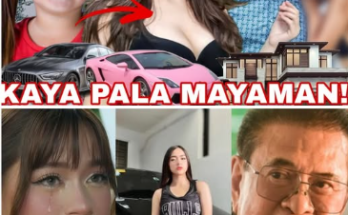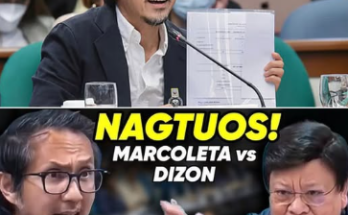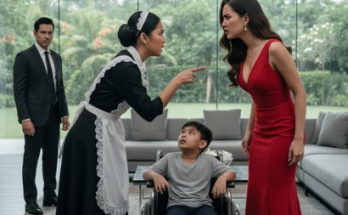He laughed—a cold, awful sound. “Are you serious? Your little librarian’s salary? Those pathetic pennies don’t even cover the utilities. I paid for this house. It’s mine. Now pack your things and get out.”
He slammed his fist on the table and smashed a glass. “Thirty minutes,” he said, then stormed out. The frame of our wedding photo fell from the wall; the glass splintered in his smile. How fitting.
I packed my things mechanically. Fifteen years of my life, given to a man who now stood at the door, looking at me with contempt.
“Where will you go?” he asked—not out of concern but with sadistic curiosity. My parents were gone. My sister Julia didn’t really like me, and after the inheritance, she didn’t want to see me. Friends? Over the years Richard had driven everyone away.
“Leave the keys on the table,” he said as he shut my suitcase. I placed the house key—the house I had filled with warmth, the house that wasn’t really mine—on the coffee table. I looked at it as if it didn’t exist.
I walked out. It was the end of October and a light rain fell. I had a few hundred dollars to my name. A hotel would cover a night or two at most. Then what?
Then it hit me. The garage. Grandpa’s old, crumbling garage that he had left me. Maybe I could sleep there for a while.
The trip took nearly two hours by bus. By the time I arrived it was dark. The industrial area looked abandoned and scary. At last I found it: Garage #123. The door was thick with rust; the padlock was so corroded it looked fused shut. I wrestled with the heavy old key the notary had given me. It wouldn’t budge. Despair fell on me. Was I really going to end up on the street?
As if in response, the lock suddenly clicked and turned. The doors opened, and there it was. With the light from my phone’s flashlight, I saw something metallic glinting under an old tarp. I pulled the edge—the tarp slipped off, revealing what lay beneath.
It was a car. But not just any car. It was a black 1950s Ford Thunderbird, perfectly preserved. I don’t know much about vintage cars, but I could tell it was a classic, a car worth a fortune.
“This can’t be real,” I whispered. Grandpa had told me about his first car, a black Thunderbird he claimed he’d sold when my father was born. It had to be true.
But that wasn’t the only surprise. Behind the car sat a small carved wooden box. Inside was an envelope, yellowed with age, my name written in unmistakable handwriting. I took it with trembling hands. Victoria—open when the time comes.
Inside was a letter and a small, delicate key. I held the letter up to the light and began to read.
My grandfather left me an old garage and gave my sister a cozy apartment in New York. My husband was unhappy; he insulted me and told me to leave.
My dear Victoria,
If you’re reading this, then the time has come—though I had hoped it never would.
I knew, even when you were just a little girl with scraped knees and big questions, that life would not always be kind to you. You felt everything too deeply, and people like that—people like us—often find the world far too rough around the edges. But pain sharpens us. Heartbreak unmasks others. And loss… well, loss reveals what truly remains.
This garage may not look like much, but it holds more than rust and memories. The Thunderbird is yours, of course. It’s not just a car—it’s freedom. I kept it running all these years, quietly, lovingly, just in case. The battery should be fine; I came by every few months to make sure it would wake when called upon. It’s registered in your name. The glovebox contains the paperwork. Drive it out of here, and it’s legal, clean, and entirely yours.
But more than the car, I left you this box and this key. The key doesn’t fit anything here—it’s for a safety deposit box, number 214, at Larchmont Bank on 5th Avenue. You’ll need your ID and this letter. Inside, you’ll find something that can help you start again. I won’t spoil the surprise, but let’s just say it’s more valuable than you think.
As for your sister—yes, I gave her the apartment. She wanted comfort. You needed resilience. One of you would always land on your feet, and I never doubted it would be you. Julia believes she won. Let her. Your story doesn’t end in an apartment with a view. Yours begins now, on your own terms.
You were never meant to be someone’s second thought, Victoria. You were meant to build, to dream, to rise. And when you do, do it without bitterness. Bitterness only rots the roots.
Drive. Leave the ashes behind.
Love always,
Grandpa
The wind howled through the cracks in the garage as I stood there, the letter trembling in my hands. A wave of something—grief, gratitude, fury, hope—swelled in my chest and caught in my throat.
I looked at the Thunderbird. Its chrome still shone beneath the dust. It looked ready. Waiting. Like it had been all these years.
I slipped the key into my coat pocket. For the first time in years, I felt something I hadn’t in a long time:
Possibility.
And I wasn’t going to waste it.



